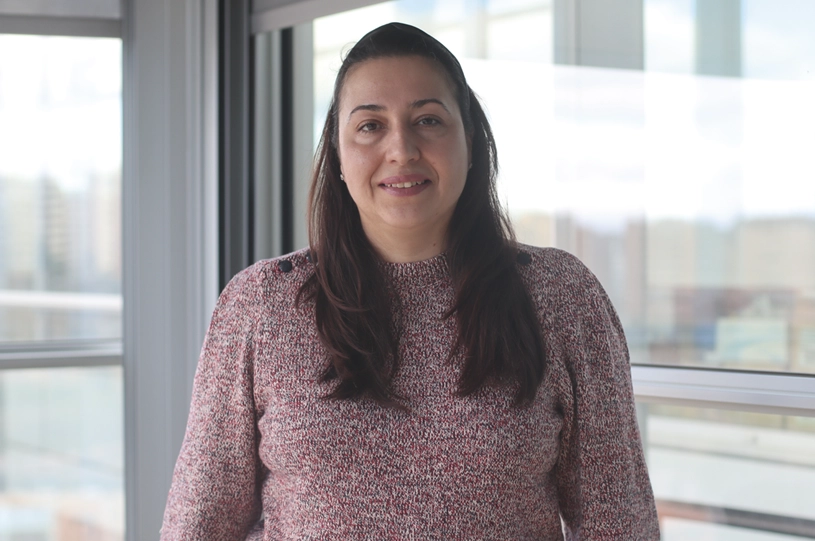Ljubica Matic: Mentors are necessary at every stage of a career”
Associate Professor in Molecular Medicine and Principal Researcher of the Vascular Surgery Division at Karolinska Institute.

Dr Ljubica Matic is Associate Professor of Molecular Medicine and Principal Researcher of the Vascular Surgery Division of Sweden’s Karolinska Institute. She obtained her degree in molecular biology at the University of Belgrade, Serbia, and holds a doctorate in biochemistry from the Karolinska Institute. Since 2019, she has been Leader of the Translational Vascular Medicine Group whose aim is translational research on novel therapeutic and diagnostic targets for the management of cardiovascular disease, specifically atherosclerosis and the complications of restenosis. Her group uses innovative, integrated multi-omics in silico pipelines to explore the Biobank of Karolinska Endarterectomy (BiKE) and identify smooth muscle cell related targets with a direct causal relationship to human vascular disease With this multidisciplinary approach, Dr Matic’s mission is to create a platform for extrapolation of the outcomes of basic research to diverse realms of clinical cardiovascular disease, which will lead to accelerated development in areas ranging from target discovery to patient treatment.
Your group works in different areas...
I have always been fascinated by the changes that occur in cells during human diseases. In the field of cardiovascular diseases, for instance, we have discovered that certain types of cell present in human vascular disease, like smooth muscle cells, are not so different as we previously thought. They can adapt and transform under different conditions, particularly in environments such as atherosclerotic plaque, where the cells need to survive for decades. My interest lies in understanding how the cells transform and adapt to these environments, essentially focussing on the mechanisms of cell survival. Atherosclerotic plaque is a micro-environment in which cells are trapped and exposed to the influence of the environment for 20, 30 or 40 years; but plaque grows for decades and many of the cells don’t want to die. They want to survive, but they somehow have to transform their own cell identity into something new in order to do so. In my opinion, this is an incredibly interesting area of study because it is about determining how a cell will decide to transform itself and how it will carry out the transformation. It is basically about survival.
At the start of your career you were more interested in scientific knowledge per se than in applied science. How has your perspective changed over time?
I initially focussed on basic science and on understanding fundamental processes. However, I became more interested in translational research when I realized its possible applications. The translational move, which links basic research with practical applications became particularly interesting for me. Despite the fact that my research still has not translated into any discovery of clinical use, I continue this line of work bearing in mind the importance of tackling the problems of human health. The really exciting part of research began for me when I came across the possibility of making the connection between basic research and basic knowledge, and how to apply it. We have data from human biobanks, and we can see how complex cardiovascular disease is for humans.
I have always been fascinated by the changes that occur in cells during human diseases
This is CNIC’s philosophy. Are you thinking of collaborating with CNIC?
We already are; together with Miguel Ángel (Del Pozo) and his group, we have applied for a project. It has a specific approach that is completely new, and my group has available human data resources, so together we make the perfect combination to tackle the matter of protein modifications and how these different protein modifications can play a role in cardiovascular disease. We make a good combination to research a completely new question.

How did your academic career take you from Serbia to Sweden?
That was in 2002, so that’s already 20 years. At that time there was hardly any investigative structure in Balkan countries, including Serbia. There was not much investment, and research was not a priority. So, for somebody interested in research, like me, staying in Serbia was not an option. I chose to study molecular biology, which clearly indicated that I would have to leave my country to devote myself to high level research. Initially, I had no specific ambition to go Karolinska University. In fact. I was considering several universities, including Heidelberg in Germany. However, during my interview at Karolinska, their research impressed me, particularly areas like the generation of knockout animals and the study of kidney and cardiovascular diseases. So the decision to move to Sweden was not solely based on scientific reasons, but rather on the need to leave my country to pursue a career as a researcher.
So you did not specifically choose the area you now research?
That’s right. It’s more as if it chose me. Although my doctorate was on kidney diseases, around ten years ago I made the transition to cardiovascular diseases. As a molecular biologist, my interest resides in understanding the bases of molecular biology behind human diseases in general, instead of focussing on one specific disease.
As a molecular biologist, my interest resides in understanding the bases of molecular biology behind human diseases in general, instead of focussing on one specific disease
You mentioned population data banks. Scandinavian countries are pioneers in this area...
In Sweden, we have a unified system and a personal number, and everything you do ends up registered under your personal number. That is a lot of information. But the information we are interested in refers to medical or hospital registers. Many Scandinavian countries have the same system. We have very high standards. The other aspect is the agreement of the Scandinavian population to contribute information and samples for research. Most people agree to provide their samples for research purposes when they go to hospital or the doctor, with informed consent, of course. These samples are kept in a biobank. Throughout Scandinavia, when patients are asked to donate their samples for research, 99% of them agree to do so. So there is a very high level of agreement to donate your own biological samples and data for research. And that is basically what feeds the whole infrastructure of biobanks.

They say that a career in research needs mentors…
Mentoring is different to supervision. It’s about trust and experience. Mentors need to have experienced various professional and personal situations to effectively relate to their mentees. Trust is crucial in the mentor-mentee relationship because it often implies sharing intimate thoughts and problems related with a career. Although not all young people can understand the value of mentorship, programmes like the ones at Karolinska seek to foster tutorial skills equally between students and professionals, acknowledging its importance throughout their careers. At Karolinska we have mentorship programmes. In addition to having their supervisor, each doctoral student at Karolinska has to have a mentor and an external mentor. They can nominate a person from another country, or it may be someone who they have a private connection with. Basically, it is a person of their choice, but they have to choose an external mentor as a part of their personnel. And then, there are also tutor programmes at Karolinska for tutorship. The idea is that even people who are relatively inexpert can try to act as mentors of young students, not only to feel what it is like to be a mentor but also to know the degree of responsibility you have as a mentor and understand the importance of the function. It’s like a trial and error mechanism. To foster a new generation in which students realise that a mentor is important and a person to turn to when you have something to talk about, something you can’t do with your department or supervisors. What’s more, inexpert mentors realise that tutorship is something that they should have throughout their careers. You need mentors at every stage of your career. I have my own mentors: I need to speak to someone with experience I trust, whose advice I will accept, can assimilate and attempt to apply.
Mentoring is different to supervision. It’s about trust and experience. Mentors need to have lived various professional and personal situations to effectively relate to their mentees
You left Serbia 20 years ago, what connections do you have with research in your home country?
I have recently been awarded a grant for an EU project to collaborate in my old institute in Belgrade (Serbia). The aim of the project is to build a research infrastructure and skills in areas like the biobank, as well as support services for research, transferring knowledge from institutions like the Karolinska. It’s my way of giving something back to my country, and I’m happy to contribute to the advance of research Serbia.













